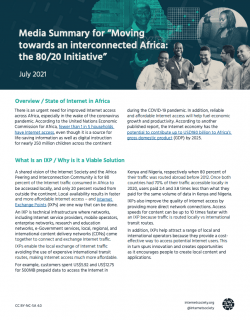Washington, DC – 6 July, 2021 – A new report published today by the Internet Society outlines the state of Internet interconnection in Africa and the critical role Internet Exchange Points (IXP) play in improving access and lowering costs. The report, entitled “Moving Toward an Interconnected Africa: The 80/20 Initiative,” examines the Internet ecosystem in Africa.
There is an urgent need to increase Internet access across the continent, especially in the wake of the coronavirus pandemic. According to the United Nations Economic Commission for Africa, fewer than 1 in 5 households have Internet access. Reliable and affordable Internet access also fuels economic growth. A recent study estimates that the Internet economy has the potential to contribute up to US$180 billion to Africa’s gross domestic product (GDP) by 2025.
An IXP is technical infrastructure where multiple networks, including Internet service providers, mobile operators, enterprise networks, research and education networks, e-Government services, and content delivery networks (CDNs) come together to connect and exchange Internet traffic.
IXPs enable the local exchange of Internet traffic instead of using expensive international transit routes. This not only makes Internet access much more affordable but also improves the quality of access by providing more direct network connections. Access speeds for content can be up to 10 times faster with an IXP because traffic is routed locally versus international transit routes.
According to the Internet Society report, the number of African IXPs has increased by 58 percent over the past eight years, from 19 in 2012 to 46 in 2020. In addition:
- More than half of the countries in Africa have an IXP; six countries have more than one.
- The most developed Internet ecosystem is in South Africa followed by Kenya and Nigeria. These countries have the most interconnected networks and have succeeded in exchanging 70-80% of their traffic locally.
- IXPs provide significant savings by localizing Internet traffic. The report shows that a network can save up to US240,0000 per year by connecting to a local IXP.
- The presence of content delivery networks has increased significantly and the amount of locally available content and demand for content hosting has increased.
The new report expands on a 2020 analysis of IXP growth in Kenya and Nigeria and provides an overview of the evolution of Internet interconnection on the continent by examining a country in each of the six subregions: Angola (Southern Africa), Burkina Faso (Western Africa), Democratic Republic of Congo (Central Africa), Egypt (Northern Africa), Mauritius (Indian Ocean), and Rwanda (Eastern Africa).
“Thanks to the continued work with partners over the years, we have many more sustainable IXPs that exchange a considerable amount of Internet traffic in Africa. But there’s still work to do to ensure that more Internet traffic is exchanged on the continent,” said Dawit Bekele, Africa Regional Vice President for the Internet Society, a global nonprofit organization promoting the development and use of the Internet.
“A key success factor for IXPs is that governments understand the value that Internet infrastructure provides, which encourages the adoption of policies and regulations that enable Internet ecosystems to thrive,” added Bekele.
Since 2008, the Internet Society has been working with the African Internet community, including community groups, technical experts and policymakers, to improve local Internet infrastructure by helping to establish IXPs and strengthen the trust and cooperation between those that build the Internet. The overall goal is for 80 percent of Internet traffic in Africa be exchanged locally, and only 20 percent routed from outside the continent.
The report, “Moving Toward an Interconnected Africa: The 80/20 Initiative,” is now available. A topline media brief is also available for download.
A webinar will be held on 6 July 2021 from 13:00-14:00 UTC to discuss the findings of the report and lessons learned from the 80/20 Initiative.
About the Internet Society
Founded in 1992 by Internet pioneers, the Internet Society is a global non-profit organization working to ensure the Internet remains a force for good for everyone. Through its community of members, special interest groups, and 120+ chapters around the world, the organization defends and promotes Internet policies, standards, and protocols that keep the Internet open, globally connected, and secure. For more information, please visit: www.internetsociety.org.
Media Contact:
Allesandra deSantillana
Internet Society
[email protected]
